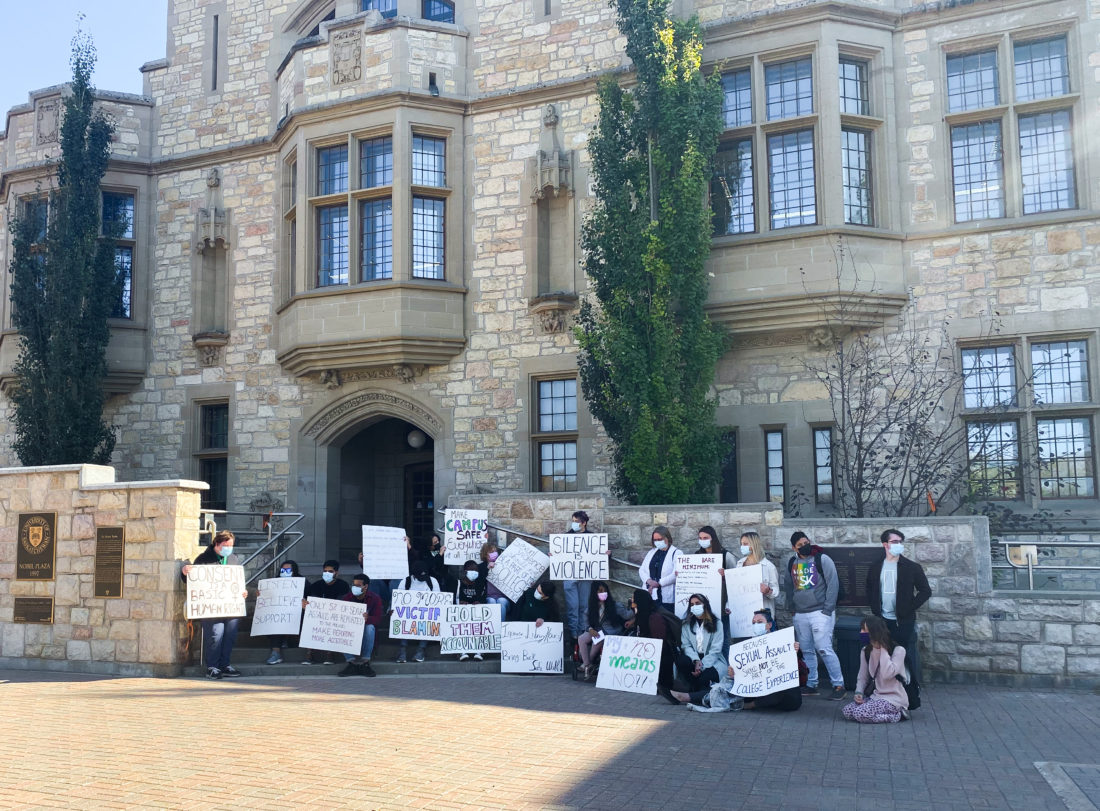
On Oct. 7, the University of Saskatchewan Students’ Union’s Rally Against Sexual Violence hosted dozens of students and university staff at Nobel Plaza.
The rally was held after a 22-year-old man was charged with a sexual assault that occurred on the evening of Sept. 29 at the U of S. Invited speakers, many of whom were survivors of sexual violence themselves, shared a variety of perspectives on the prevalence of sexual assault and its handling on campus.
“We gather in solidarity with survivors and in recognition of our individualized lived experiences,” USSU president Tasnim Jaisee said at the rally.
Jaisee spoke about how the underreporting of sexual violence on campus is clear. She says that in 2019, 11 reports were received at the U of S, while Statistics Canada reported that 71 per cent of students at postsecondary schools witnessed or experienced sexual harassment or assault in 2019.
“Long-term framework changes have to be made in order to create a pathway of sustainable funding to go towards student resources,” Jaisee told the Sheaf.
Jay Wilson, interim vice-provost teaching, learning, and student experience at the U of S, told the Sheaf that the university’s sexual assault prevention policies are continually being improved with the input of student leadership.
“I’m just impressed with our students because they aren’t sitting back there. They’re holding us to account, but they’re also really involved in the process [of improving campus safety] and that’s what we want. That’s what any university wants,” Wilson said.
Harleen Arora, a student in the Edwards School of Business, was a speaker at the event and shared her perspective as an international student.
International students are a minority group, and may be distanced from their networks of support, or face an imbalance of power between themselves and their landlords and employers due to financial stressors. Arora says these factors may increase their vulnerability to experiencing abuse or seeking help as survivors.
“My family was thousands of miles away [when I came to Canada], and I’m grateful to still have my friends and people who I call family,” Arora said. “But I also recognize that it is daunting to navigate systems which you’ve never navigated before, that it is daunting to access help in the ways that you need it, especially when you’re so unfamiliar with it.”
In 2018, Statistics Canada reported that 63 per cent of Indigenous women have been physically or sexually assaulted in their lifetime, compared to 45 per cent of non-Indigenous women. Aubrey-Anne Laliberte-Pewapisconias, a Cree student in the Edwards School of Business, spoke at the rally about how this knowledge is constantly on her and her family’s minds, making it all the more important that campus represent a safe space.
“My parents didn’t have to remind me of those statistics lots of the time. They didn’t have to be worried because they put their trust in this institution to keep me safe — safe to learn, safe to study, safe to exist. And since this news [of the Sept. 29 sexual assault], we’ve lost that comfort,” Laliberte-Pewapisconias said.
Rene Clarke, the USSU Pride Centre coordinator, also spoke at the rally and reminded attendees of the support that the centres provide.
Clarke also called for improvements to the current reporting system on campus, highlighting the one-year limit to make a complaint except in “exceptional circumstances” in the current U of S Sexual Assault Prevention Policy.
“It is a fact that the majority of survivors need time to process, time to realize, and time to heal ourselves to where we are strong enough to get our justice,” Clarke said.
—
Sandra LeBlanc | News Editor
Photo: Sandra LeBlanc | News Editor
Leave a Reply